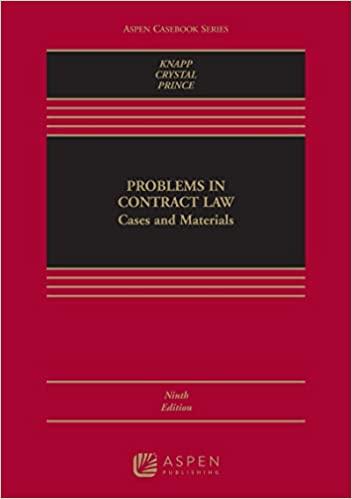Question
1.According to the valuation method based on tax shields, the value of the company (vI) is the value of the unleveraged company (Vu) plus the
1.According to the valuation method based on tax shields, the value of the company (vI) is the value of the unleveraged company (Vu) plus the value of the tax shields (VTS). So does the value of the company increase if I a call my bank and tell them to charge me double the interest?
2.I cannot seem to start valuation .in order to calculate E+D=VA(FCF;WACC) I need the WACC and in order to calculate the WACC I need D and E .where should I start?
3.Does the book value of the debt always coincide with its market value?
4.Is the Free Cash Flow (FCF) the sum of the equity cash flow and the debt cash flow?
5.What is NOPAT (Net Operating profit After tax)?
6.What is EBITDA(Earning before interest ,Taxes, Depreciation and Amortization)?
7.I do not understand the meaning of workingcapital requirements, I think it should be similar to working capital (Current Assets-current liabilities).Am I right?
8.Why can we not calculate the required return (Ke)from the Gordon-Shapiro model(p0= DIV0(1+g)/(ke-g) instead of using the CAPM ?As we know the current dividend (Div0)and the current share price(p0),we can obtain the growth rate of the dividend from the formular g=ROE(1-p)/(1-ROE(1-p),p being the payout.
9.Assume I calculate g as ROE (1-p)/(1-ROE(1-p)) and the Ke from the CAPM. I replace both values in the formula PER =(ROE(1+g) -g)/ROE (Ke-g) but the PER I obtain is totally different from the one I get by dividing the quotation of the share to the earnings per share. Is it possible to interpret that difference as an overvaluation or undervaluation of that share on the market?
10.I was assigned a valuation of the shares of a pharmaceutical laboratory. Which valuation method is more convenient?
11.I need to know how to value a company well, but I cannot clearly see the valuation process of a company starting from its past income statements. What are the systematical steps I need to take? Firstly , I think I should elaborate the provisional statements for the following fiscal years and then calculate the cash flows, discount them at the present moment (with a discount factor), add the terminal value to it and the difference between the book net value and the market value of intangibles. I really need that these steps be methodical and easy to understand so I can use them as a guide when valuing a company.
Step by Step Solution
There are 3 Steps involved in it
Step: 1

Get Instant Access to Expert-Tailored Solutions
See step-by-step solutions with expert insights and AI powered tools for academic success
Step: 2

Step: 3

Ace Your Homework with AI
Get the answers you need in no time with our AI-driven, step-by-step assistance
Get Started


